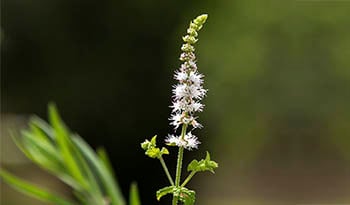Adaptogens for Women’s Health
DISCLAIMER:This blog does not intend to provide diagnosis...
- In this article:
- Panax Ginseng
- Ashwagandha (Withania somnifera)
- Licorice (DGL or deglycyrrhizinated licorice)
- Maca Root
- Rhodiola

An adaptogen is an herbal substance that helps protect a cell from damage caused by environmental and chemical stressors. Their strength and ability to protect against these stressors is due to that fact that they grow under harsh climate conditions. For example, Rhodiola and ginseng, two well-known adaptogens grow 10,000 feet (3 km) above sea level, an altitude where oxygen is low and weather is cold. According to Life Extension’s Book on Disease Prevention, for an herb to be classified as an adaptogen, it must has to meet three criteria: it must be non-toxic, have a physiologic normalizing ability, and have more than one mechanism of action.
Adaptogens can be a great boost to women's health due to their ability to improve the immune system, fight fatigue, reduce menopausal symptoms and more.
Panax Ginseng
Panax ginseng is taken for a great number of medical conditions. The origins of this plant start in Korea, and it has been used for over 2,000 years since. Also grown in areas of China and Siberia, panax ginseng is unique—it should not be mixed up with other known ginsengs, such as the American or Siberian ginseng. Panax ginseng is also referred to as Korean ginseng, Chinese ginseng, or Asian ginseng.
Available in tablet, liquid, or powder form, the dosage of panax ginseng varies, depending on the reason it's being used. The length of time one should take it is also dependent on certain factors. While there are many benefits to taking panax ginseng, some of the more popular ones backed by a great deal of research include the following:
- Immune system support
- Cancer-fighting properties
- Cardiovascular health
- Neurological health
- Weight management
- Blood sugar control
- Anxiety and depression
- Fatigue
Suggested dose: As directed on the label. Can also be consumed as a hot tea.
Ashwagandha (Withania somnifera)
Ashwagandha can be helpful in managing chronic low energy. Native to Asia, specifically India and regions of China, this herb is commonly used in Ayurvedic medicine as therapy for fatigue for two reasons:
Improves energy
A 2013 study in Integrative Cancer Therapies showed that ashwagandha could help improve energy and quality of life in those undergoing treatment for cancer.
Improves endurance
Animal studies have also shown that ashwagandha can help improve energy levels and endurance. A 2015 study of athletes in Ayu showed that ashwagandha could help improve endurance and quality of life.
Suggested dose: Ashwagandha - 500 mg once or twice per day
Licorice (DGL or deglycyrrhizinated licorice)
When most think of licorice, candy (not an herb) comes to mind. However, licorice is an herb that has long played an important role in Traditional Chinese Medicine. It is frequently used to help those with adrenal fatigue, a common condition in women. The active ingredient in licorice is glycyrrhizin and genistein among others.
Studies have shown the benefit of DGL licorice for decades. A 1968 study showed this natural medicine's ability to help heal stomach ulcers and intestinal ulcers while a 1978 study in the British Medical Journal showed it may also be of benefit in the prevention of stomach ulcers. However, it is also beneficial for those who have an upset stomach according to a 2012 study.
Suggested dosage: Licorice root 450-900 mg daily.
Maca Root
Maca root (Lepidium meyenii) is an adaptogenic herb cultivated in the Andes Mountains of South America. It grows at elevations of 13,000 to 16,000 feet (4000-5000 m) above sea level. Traditionally used by the Incas, maca has had numerous medicinal benefits and was used primarily to improve both libido and fertility. It was considered an aphrodisiac by many. Over time, other benefits have been observed:
Improve anxiety-related symptoms
A 2008 study in Menopause showed that women who took 3.5 grams per day of maca had a reduction in anxiety- and depression-related symptoms and lower levels of sexual dysfunction when compared to women who took a placebo pill.
Improve menopausal-related symptoms
Around age 50, women start to have hormonal changes commonly known as menopause. While most women go through this change seamlessly, some experience menopause-related symptoms, which can be difficult. A 2005 study showed maca could improve symptoms women undergo during early menopause.
Improve Libido
Millions of women worldwide take anti-depressant and anti-anxiety medications. A common side effect of these medications, which are known as SSRI (Selective Serotonin Reuptake Inhibitors) is the reduction in libido, or sex-drive. A 2015 study concluded that maca root could help alleviate this common side effect.
Suggested dose: As directed on the label.
Rhodiola
Also known as "golden root", rhodiola grows in the arctic regions of Asia and Eastern Europe—it's also called "arctic root" for that reason. It is a staple of Traditional Chinese Medicine and was also used by Vikings for its ability to increase stamina and help the body deal with the effects of environmental and psychological stressors. It has many benefits for women today.
Anti-fatigue effect
Rhodiola may be an option for those with unexplained fatigue. A 2009 study in Planta Medica concluded that use of rhodiola has an anti-fatigue effect.
Improves physical endurance
Athletes at all levels of competition frequently search for ways to improve their endurance. Rhodiola may be beneficial. A 2009 study in the Chinese Journal of Integrative Medicine concluded, “The combined herbal supplement of Rhodiola and Gingko could improve the endurance performance by increasing oxygen consumption and protecting against fatigue”. A 2013 study in the Journal of Strength and Conditioning Research also supported rhodiola’s ability to improve exercise endurance.
Anxiety and Depression
Millions of people worldwide are affected by symptoms of anxiety and depression. For many, it can be life-altering and have physical repercussions as well. Consulting with a counselor or psychologist can be beneficial, but sometimes it is not enough. Medications are frequently prescribed but many worry about side effects and desire a more natural approach.
A 2016 study in Phytomedicine showed Rhodiola could be an effective treatment for those suffering from depression. A 2015 study by Dr. Cropleyconcluded Rhodiola users
“….demonstrated a significant reduction in self-reported anxiety, stress, anger, confusion and depression at 14 days and a significant improvement in total mood.”
Protect Against Dementia and Alzheimer’s
Rhodiola can help protect the brain against oxidative damage and can play an important part in the prevention and treatment of dementia. This vital adaptogen plays a role in the natural approach to Alzheimer’s disease by UCLA Neurologist, Dr. Dale Bredesen. Learn more.
Numerous studies have shown the benefits of rhodiola, including a 2016 study by Dr. Bei Zhang. A 2015 study included rhodiola as a promising treatment in Traditional Chinese Medicine.
High Blood Pressure
High blood pressure affects millions of women worldwide. A 2017 study showed Rhodiola had blood-pressure-lowering benefits. A 2012 study in Phytotherapy Research also demonstrated rhodiola’s blood-pressure-lowering properties when consumed regularly. A 2006 study using rabbits showed Rhodiola could lower an enzyme called ACE (angiotensin-converting enzyme). This is similar to a class of drugs doctors used called ACE-inhibitors. Note: never stop taking blood pressure medications unless under the advice of your physician.
Suggested Dosage: Rhodiola capsule – 200-500 mg once or twice per day or as directed on the label. Rhodiola liquid extract – as directed on the label.
References:
- Integrative Cancer Therapies. 2013 Jul;12(4):312-22. doi: 10.1177/1534735412464551. 2012 Nov 9.
- J Med Food. 2002 Winter;5(4):211-20. Ashwagandha improves endurance in animal studies.
- Choudhary B, Shetty A, Langade DG. Efficacy of Ashwagandha (Withania somnifera [L.] Dunal) in improving cardiorespiratory endurance in healthy athletic adults. Ayu. 2015;36(1):63-68. doi:10.4103/0974-8520.169002.
- Tewari SN, Trembalowicz FC. Some experience with deglycyrrhizinated liquorice in the treatment of gastric and duodenal ulcers with special reference to its spasmolytic effect. Gut. 1968;9(1):48-51.
- Hollanders D, Green G, Woolf IL, et al. Prophylaxis with deglycyrrhizinised liquorice in patients with healed gastric ulcer. British Medical Journal. 1978;1(6106):148.
- Raveendra KR, Jayachandra, Srinivasa V, et al. An Extract of Glycyrrhiza glabra (GutGard) Alleviates Symptoms of Functional Dyspepsia: A Randomized, Double-Blind, Placebo-Controlled Study. Evidence-based Complementary and Alternative Medicine : eCAM. 2012;2012:216970. doi:10.1155/2012/216970.
- Brooks N. A., Wilcox G., Walker K. Z., Ashton J. F., Cox M. B., Stojanovska L. Beneficial effects of Lepidium meyenii (Maca) on psychological symptoms and measures of sexual dysfunction in postmenopausal women are not related to estrogen or androgen content. Menopause. 2008;15(6):1157–1162.
- Meissner HO, Kapczynski W, Mscisz A, Lutomski J. Use of Gelatinized Maca (Lepidium Peruvianum) in Early Postmenopausal Women. International Journal of Biomedical Science : IJBS. 2005;1(1):33-45.
- Chinese Journal of Integrative Medicine. 2009 Jun;15(3):177-83. doi: 10.1007/s11655-009-0177-x. Epub 2009 Jul 2.
- Journal of Strength Conditioning Research. 2013 Mar;27(3):839-47. doi: 10.1519/JSC.0b013e31825d9799.
- Phytomedicine. 2016 Jun 15;23(7):770-83. doi: 10.1016/j.phymed.2016.02.009. Epub 2016 Feb 24.
- Phytother Res. 2015 Dec;29(12):1934-9. doi: 10.1002/ptr.5486. Epub 2015 Oct 27.
- Zhang B, Wang Y, Li H, et al. Neuroprotective effects of salidroside through PI3K/Akt pathway activation in Alzheimer’s disease models. Drug Design, Development and Therapy. 2016;10:1335-1343. doi:10.2147/DDDT.S99958.
- Sun Z-K, Yang H-Q, Chen S-D. Traditional Chinese medicine: a promising candidate for the treatment of Alzheimer’s disease. Translational Neurodegeneration. 2013;2:6. doi:10.1186/2047-9158-2-6.
- Ma Y-G, Wang J-W, Bai Y-G, Liu M, Xie M-J, Dai Z-J. Salidroside contributes to reducing blood pressure and alleviating cerebrovascular contractile activity in diabetic Goto-Kakizaki Rats by inhibition of L-type calcium channel in smooth muscle cells. BMC Pharmacology & Toxicology. 2017;18:30. doi:10.1186/s40360-017-0135-8.

 By Dr. Eric Madrid, M.D.
By Dr. Eric Madrid, M.D.


